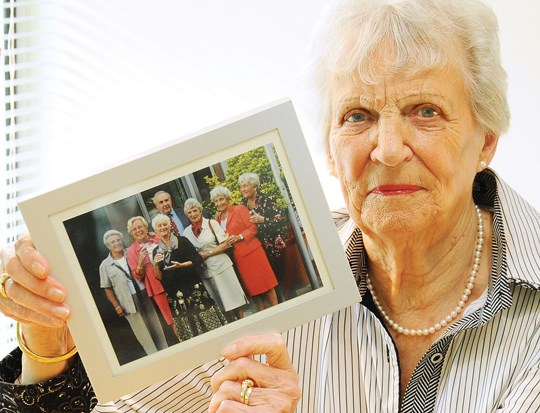Marleen Cotterill has lived in Canada since 1963 and in West Vancouver since 2001.
She is a Canadian citizen with sons and grandsons born in this country, yet a piece of Marleen's heart will always belong to Holland.
Marleen's family goes back a long way in that part of the world, to the 1700s. Her father was "pure Amsterdam" and her mother half Dutch and half German. She had uncles who fought for the Allies and for the Axis forces during the Second World War. Twelve years old when the war ended,
Marleen was six and just starting school when it began.
"It stays with us, the part I remember. It was very cold and we were very hungry.
It was," Marleen counts in Dutch, "1944 to '45, the 'Hongerwinter.' We made the beds with our gloves on and ice flowers grew on the insides of the windows. There was no heat. We got light from kerosene lanterns and from oil lamps that spilled and left greasy marks everywhere."
A dozen people lived in the family home in Bussum during the war, including Marleen's parents, her brother Paul and her five sisters. When baby Tineke was born in 1943, an aunt came to help out. There was room for an orphaned cousin and a girl from the country, stranded by the war. Two neighbour boys regularly found refuge with the family. "The Germans marched through the streets looking for food or reinforcements, whatever they wanted. We knew when they were coming, they were always singing. The boys would run to our house and we would hide them inside a cupboard behind a trap door."
There was no food. In the attic was a big, round yellow cheese.
"We never touched it. It was there if we really needed it. I still see that yellow cheese but I don't remember what happened to it. Mainly, we ate potatoes. My sisters would go out to the fields and search for potato plants that mother made into soup and even cookies," she says.
When there were no potatoes to be found, they ate "rabbit food" - wild greens that her mother transformed into a dish she called "spinach."
"My father would take his bicycle without rubber tires and go for food from the farms. Once he went off with a friend, pulling a wagon. After two days, they returned with eggs, meat and potatoes. There were no fridges so we cooked the meat and put everything in the basement. The smell of the cooked meat; I guess that's how it happened. The next morning, everything was gone. Only the potatoes were left. The thieves must have put a child through the iron bars on the basement windows. The only time I saw my father cry was that day and on the day I left for Canada," she says.
Life went on during the Nazi occupation. When the German army took over the schools to house its soldiers, the Dutch children learned their lessons in neighbours' houses, "except on sunny days when the bombers flew over us," remembers Marleen.
"Our parents were always very social. Towards the end of the war, they would slip out under cover of the neighbourhood gardens to friends' houses where they could 'bridge' and have a bit of fun."
On May 5, 1945, the First Canadian Army liberated Holland. They brought peace and with it, food, coal and medical supplies. "The Canadians were so friendly, always smiling, and generous, always giving us all the food they had with them."
The war left its mark on the family. Marleen's feet ache from years of wearing shoes she had outgrown. Her bones ache from that wartime diet of potatoes and little else. But, she and her brother and sisters, still living back in Holland, remain as closely connected as they had been in childhood, through Skype, phone and email. Marleen attends St. Stephen's Anglican Church and continues to "bridge" at the seniors' centre, where she also volunteered for many years.
Her sons and grandsons live nearby. Life for Marleen Cotterill continues to be productive and fulfilling, and in her refrigerator there is always a wedge of Dutch cheese.
Email [email protected]



